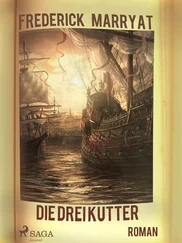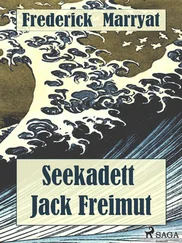Frederick Marryat - Masterman Ready
Здесь есть возможность читать онлайн «Frederick Marryat - Masterman Ready» — ознакомительный отрывок электронной книги совершенно бесплатно, а после прочтения отрывка купить полную версию. В некоторых случаях можно слушать аудио, скачать через торрент в формате fb2 и присутствует краткое содержание. Год выпуска: 0101, Жанр: foreign_antique, foreign_prose, на английском языке. Описание произведения, (предисловие) а так же отзывы посетителей доступны на портале библиотеки ЛибКат.
- Название:Masterman Ready
- Автор:
- Жанр:
- Год:0101
- ISBN:нет данных
- Рейтинг книги:4 / 5. Голосов: 1
-
Избранное:Добавить в избранное
- Отзывы:
-
Ваша оценка:
- 80
- 1
- 2
- 3
- 4
- 5
Masterman Ready: краткое содержание, описание и аннотация
Предлагаем к чтению аннотацию, описание, краткое содержание или предисловие (зависит от того, что написал сам автор книги «Masterman Ready»). Если вы не нашли необходимую информацию о книге — напишите в комментариях, мы постараемся отыскать её.
Masterman Ready — читать онлайн ознакомительный отрывок
Ниже представлен текст книги, разбитый по страницам. Система сохранения места последней прочитанной страницы, позволяет с удобством читать онлайн бесплатно книгу «Masterman Ready», без необходимости каждый раз заново искать на чём Вы остановились. Поставьте закладку, и сможете в любой момент перейти на страницу, на которой закончили чтение.
Интервал:
Закладка:
Captain Frederick Marryat
Masterman Ready
Chapter One.
It was in the month of October, 18—, that the Pacific , a large ship, was running before a heavy gale of wind in the middle of the vast Atlantic Ocean. She had but little sail, for the wind was so strong, that the canvas would have been split into pieces by the furious blasts before which she was driven through the waves, which were very high, and following her almost as fast as she darted through their boiling waters; sometimes heaving up her stern and sinking her bows down so deep into the hollow of the sea, that it appeared as if she would have dived down underneath the waves; but she was a fine vessel, and the captain was a good seaman, who did what he considered best for the safety of his vessel, and then put his trust in that Providence who is ever watchful over us.
The captain stood before the wheel, watching the men who were steering the ship; for when you are running before a heavy gale, it requires great attention to the helm: and as he looked around him and up at the heavens, he sang in a low voice the words of a sea song:
“One wide water all around us,
All above us one black sky.”
And so it was with them;—they were in the middle of the Atlantic, not another vessel to be seen, and the heavens were covered with black clouds, which were borne along furiously by the gale; the sea ran mountains high, and broke into large white foaming crests, while the fierce wind howled through the rigging of the vessel.
Besides the captain of the ship and the two men at the wheel, there were two other personages on deck: one was a young lad about twelve years old, and the other a weather-beaten old seaman, whose grisly locks were streaming in the wind, as he paced aft and looked over the taffrail of the vessel.
The young lad, observing a heavy sea coming up to the stern of the vessel, caught hold of the old man’s arm, crying out—“Won’t that great wave come into us, Ready?”
“No, Master William, it will not: don’t you see how the ship lifts her quarters to it?—and now it has passed underneath us. But it might happen, and then what would become of you, if I did not hold on, and hold you on also? You would be washed overboard.”
“I don’t like the sea much, Ready; I wish we were safe on shore again,” replied the lad. “Don’t the waves look as if they wished to beat the ship all to pieces?”
“Yes, they do; and they roar as if angry because they cannot bury the vessel beneath them: but I am used to them, and with a good ship like this, and a good captain and crew, I don’t care for them.”
“But sometimes ships do sink, and then everybody is drowned.”
“Yes; and very often the very ships sink which those on board think are most safe. We can only do our best, and after that we must submit to the will of Heaven.”
“What little birds are those flying about so close to the water?”
“Those are Mother Carey’s chickens. You seldom see them except in a storm, or when a storm is coming on.”
The birds which William referred to were the stormy petrels.
“Were you ever shipwrecked on a desolate island like Robinson Crusoe?”
“Yes, Master William, I have been shipwrecked; but I never heard of Robinson Crusoe. So many have been wrecked and undergone great hardships, and so many more have never lived to tell what they have suffered, that it’s not very likely that I should have known that one man you speak of, out of so many.”
“Oh! but it’s all in a book which I have read. I could tell you all about it—and so I will when the ship is quiet again; but now I wish you would help me down below, for I promised mamma not to stay up long.”
“Then always keep your promise like a good lad,” replied the old man; “now give me your hand, and I’ll answer for it that we will fetch the hatchway without a tumble; and when the weather is fine again, I’ll tell you how I was wrecked, and you shall tell me all about Robinson Crusoe.”
Having seen William safe to the cabin door, the old seaman returned to the deck, for it was his watch.
Masterman Ready, for such was his name, had been more than fifty years at sea, having been bound apprentice to a collier which sailed from South Shields, when he was only ten years old. His face was browned from long exposure, and there were deep furrows on his cheeks, but he was still a hale and active man. He had served many years on board of a man-of-war, and had been in every climate: he had many strange stories to tell, and he might be believed even when his stories were strange, for he would not tell an untruth. He could navigate a vessel, and, of course, he could read and write. The name of Ready was very well suited to him, for he was seldom at a loss; and in cases of difficulty and danger, the captain would not hesitate to ask his opinion, and frequently take his advice. He was second mate of the vessel.
The Pacific was, as we have observed, a very fine ship, and well able to contend with the most violent storm. She was of more than four hundred tons burthen, and was then making a passage out to New South Wales, with a valuable cargo of English hardware, cutlery, and other manufactures. The captain was a good navigator and seaman, and moreover a good man, of a cheerful, happy disposition, always making the best of everything, and when accidents did happen, always more inclined to laugh than to look grave. His name was Osborn. The first mate, whose name was Mackintosh, was a Scotsman, rough and ill-tempered, but paying strict attention to his duty—a man that Captain Osborn could trust, but whom he did not like.
Ready we have already spoken of, and it will not be necessary to say anything about the seamen on board, except that there were thirteen of them, hardly a sufficient number to man so large a vessel; but just as they were about to sail, five of the seamen, who did not like the treatment they had received from Mackintosh, the first mate, had left the ship, and Captain Osborn did not choose to wait until he could obtain others in their stead. This proved unfortunate, as the events which we shall hereafter relate will show.
Chapter Two.
Master William, whom we have introduced to the reader, was the eldest boy of a family who were passengers on board, consisting of the father, mother, and four children: his father was a Mr Seagrave, a very well-informed, clever man, who having for many years held an office under government at Sydney, the capital of New South Wales, was now returning from a leave of absence of three years. He had purchased from the government several thousand acres of land; it had since risen very much in value, and the sheep and cattle which he had put on it were proving a source of great profit. His property had been well managed by the person who had charge of it during his absence in England, and he was now taking out with him a variety of articles of every description for its improvement, and for his own use, such as furniture for his house, implements of agriculture, seeds, plants, cattle, and many other things too numerous to mention.
Mrs Seagrave was an amiable woman, but not in very strong health. The family consisted of William, who was the eldest, a clever, steady boy, but, at the same time, full of mirth and humour; Thomas, who was six years old, a very thoughtless but good-tempered boy, full of mischief, and always in a scrape; Caroline, a little girl of seven years; and Albert, a fine strong little fellow, who was not one year old: he was under the charge of a black girl, who had come from the Cape of Good Hope to Sydney, and had followed Mrs Seagrave to England. We have now mentioned all the people on board of the Pacific: perhaps we ought not to forget two shepherd’s dogs, belonging to Mr Seagrave, and a little terrier, which was a great favourite of Captain Osborn, to whom she belonged.
Читать дальшеИнтервал:
Закладка:
Похожие книги на «Masterman Ready»
Представляем Вашему вниманию похожие книги на «Masterman Ready» списком для выбора. Мы отобрали схожую по названию и смыслу литературу в надежде предоставить читателям больше вариантов отыскать новые, интересные, ещё непрочитанные произведения.
Обсуждение, отзывы о книге «Masterman Ready» и просто собственные мнения читателей. Оставьте ваши комментарии, напишите, что Вы думаете о произведении, его смысле или главных героях. Укажите что конкретно понравилось, а что нет, и почему Вы так считаете.












